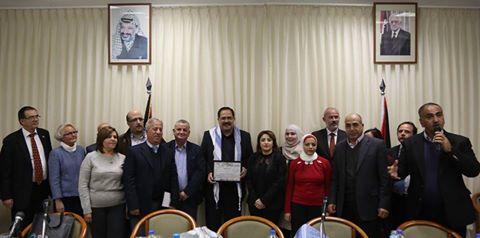Belgium hands over co-chair to Finland during the Education Sector Working Group in Ramallah
Ramallah –
On 12 December 2016 the last Education Sector Working Group of the year took
place at the Ministry of Education and Higher Education. This meeting which
gathers all education stakeholders in the Palestinian Territories, including officials
of the MoEHE, national and international civil society, and development
partners, takes place every three months at the MoEHE to discuss developments
and challenges within the education sector in the Palestinian Territories.
His
Excellency, the Minister of Education and Higher Education Dr. Sabri
Saidam, announced that the role of the co-chair of the ESWG, which is
currently fulfilled by the Consulate General of Belgium, will be transferred to the
Representation of Finland, as of 1st January 2017. His Excellency thanked
the Belgian Delegation for their hard work for two and a half year. Mr. Bruno Jans, Consul General of Belgium,
looked back at the many achievements of the education sector in the past two
years, a sector that is seen as exemplary of the Sector Wide Approcach in the
Palestinian Territories. He also stressed the continuation of collaboration with
Belgium including through the Joint
Financing Arrangement. Belgium will continue to play a pivotal role
particularly in the areas of TVET, curriculum development, education in
emergency, public finance management and digitalization, as well as in the
Service Delivery Pillar on Education of the EU Joint Framework.
During the Education Sector
Working Group, key officials of the MoEHE presented the new framework of
the Education Sector Strategy (2017-2022) and the Annual Work Plan and Budget
for Financial Year 2017, followed by a group discussion with questions and
answers.
In
her welcoming remarks at the meeting, Ms. Florence Duvieusart, Consul and Head
of Development Cooperation at the Consulate General of Belgium commended the MoEHE for
the hard work implemented in the sector under the dynamic leadership of the Minister, and in genuine partnership with
Development Partners. She stressed the positive developments that took place in
2016 in the areas of Financial Management, Technical and Vocational Education
& Training, Digitalisation, and Education in Emergency. She then acknowledged the need in 2017 to
target investments in vulnerable areas like East Jerusalem, Gaza and Area C,
and the need to enhance efforts to better coordinate development aid and
humanitarian aid. She pledged continued support from international partners in
these endeavours.
In his welcoming remarks,
UNESCO Representative to the Palestinian Territories, Dr. Lodovico Folin-
Calabi, applauded the launch of the new National Policy Agenda and the
achievements made in the education sector such as the introduction of the new
Tawjihi system, TVET, curriculum reform and the developments made with early
childhood education. Dr. Folin Calabi mentioned “these are big steps
taken in a very short duration which will affect positively the learning
outcomes of our children and help bridging the gap between the supply and
demand in the Palestinian labour market”.
At the end of the meeting,
the Digitalization for Development Prize
that the Palestinian Ministry of Education and Higher Education had won
earlier this month in Belgium, was handed over to the Minister and the project
team that had been responsible for the achievements.
Latest news from this project
No news

